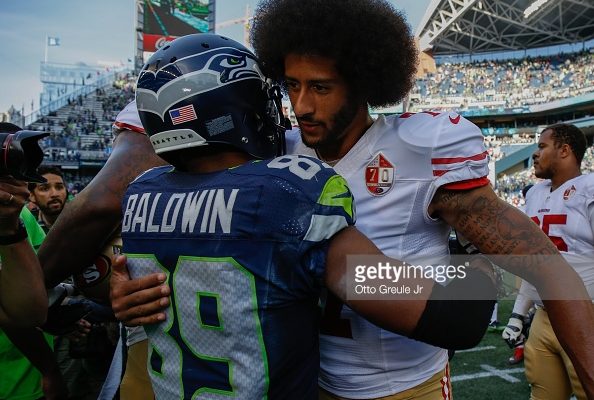Note: This Column also appears on The Lead Sports. You can check it out at: http://www.theleadsports.com/stories/lets-talk-about-colin-kaepernick/
I don’t like watching someone kneel or sit during the national anthem. Personally, I love the national anthem. I stand, remove my hat, put my hand over my heart and sing out loud when I go to ball games. But I have to recognize that much of the reason why I love our country so much is because we are a better nation by allowing people to sit or kneel during the anthem than we would be if the government forced us to stand. So while it gets at me to watch someone disrespect our nation’s anthem, I like institutionalized racism and racial inequality even less.
In watching the ripple effect from Colin Kaepernick’s continued protest it upsets me that nuance is lost on many. As with many other topics nowadays it seems like you either have to be all in or publicly damn Kaepernick and those who have joined him. The common question you hear is: “Do you support Colin Kaepernick?” The answer I support is: “Let’s talk about it.”
So, let’s talk about it. First, why does Colin Kaepernick say that he is protesting? I differentiate that from “why is Colin Kaepernick protesting?” because there are some who think he’s just crying out for attention because he’s now second string. If that’s what he is doing, he sure is putting a lot of money where his mouth is. But for the sake of this column, let us take the man at his word that his endgame is societal change.
Colin Kaepernick says he is protesting because “[t]here are bodies in the street and people getting paid leave and getting away with murder.” Generally speaking, he is protesting the mistreatment of African Americans and other similarly situated minorities in our nation.
Let us take a look at some of what Colin Kaepernik’s protest has led to. First, there is the aforementioned $1 million that he is donating to help those who are disadvantaged. Not a bad start. Then there has been some great headway made by Doug Baldwin in terms of generating a dialogue.
However, a more telling example of the road down which we are headed takes us to the basketball court. The NBA has a rule on its books that required players to stand for the national anthem. Rule II H(2) to be exact. It was famously broken by Mahmoud Abdul-Rauf, who continues to feel the effects of his protest. Now, the NBA and the NBA Players Association have gotten together to devise a means for the players to peacefully protest in a manner that they deem appropriate. That is all well and good, but to what end?
My law school professor, Professor Laurie Levenson, taught us that we have to identify problems in our society. That is part one. However, it is not enough to merely identify a problem, we must propose and produce solutions. That is part two.
Doug Baldwin, as referenced above, brought up a great point regarding policing practices and procedures. I played golf on my honeymoon with a police sergeant in Bermuda (if you’re looking for how I got to play golf on my honeymoon, email me and I’ll give you my secrets). The sergeant had previously been a police officer in Scotland. I asked him about his views on the news out of the U.S. regarding the police killings. His opinion was that the police training was clearly out of whack in the U.S. and he believed it was due to the militarization of the police force in the U.S. I asked him about the racial element and he said that he could see it, but that the larger issue was the prevalence of the use of deadly force in situations that don’t warrant it. Well, that sounds like a conversation we should at least be engaging in, despite whether or not you agree with it, given the fact that people have been pushed so far as to riot in the streets in protest.
Speaking of which, for those with their heads in the sand, there is a protest over the police killing of an African American man going on in Charlotte, North Carolina. But something else happened in the Tar Heel state that got less coverage and less of a protest. North Carolina put a law on the books that disproportionately affected African Americans to prevent them from voting, targeting them with, as the Supreme Court noted, “almost surgical precision.” The Supreme Court blocked the law from being enforced, but we have to realize what is happening in the world around us. And isn’t that the spirit of what Kaepernick’s protest is about?
But spirit and meaningful change are two different things. Doug Baldwin also brought up the State Attorney Generals needing to step in and review “their policies and training policies for police and law enforcement to eliminate militaristic cultures while putting a higher emphasis on de-escalation tactics and crisis management measures.” Well, how do these State AG’s get into power? We’re in an election year and one would think that a good place to start as far as tipping the scales back somewhere toward the center would be to focus on the invalidation of part of the Voting Rights Act by the U.S. Supreme Court three years ago. I’ve heard Martin Luther King, Jr.’s name invoked a lot with the conversations surrounding Colin Kaepernick. Didn’t MLK protest specifically to have that Voting Right’s Act put into place?
To all of this, there are many people on the right wing who look at the protests as to the police shooting unarmed African Americans and say, “but what about all of the black on black killings in Chicago?” Well, what about them? To that, in my opinion, we should have the same response: Let’s talk about it . . . How do we change what’s going on in our nation’s inner cities (ok, fine, I’d also bring up that there’s a difference between a citizen killing another citizen and a state actor like a policeman killing a citizen)? But, more importantly, this is a conversation that needs to happen and doesn’t. Because we’re all so deeply entrenched in our own camps that we can’t venture out to listen to what the other side has to say.
It is abundantly clear that we’re not having the right discussions. We have Michael Bennett saying that nothing’s going to happen until white guys get involved. Well, what then Michael? Cliff Avril points to Aaron Rodgers. Really? He’s the game changer? What, he’s going to discount doublecheck our society into harmony? And then we have Steve Clevenger being a racist moron while condemning the protests. Clevenger was subsequently suspended without pay for the remainder of the season (kudos to the Mariners, although it’s a little easier to take a public stand against someone with a lifetime .227 batting avg. who is underperforming even that this year). Regardless, what do we really make of these guys? Talking about Michael Bennett, Cliff Avril, Steve Clevenger, Mike Ditka, Trent Dilfer, Dabo Swinney, etcetera, etcetera, will get everybody exasperated and exactly nowhere.
If we want meaningful change, we need to have meaningful conversations. To have meaningful conversations, we need to hear from the people trying to effectuate change as to what specifically they want done. Yes, racial equality would be great. But it’s not going to happen just by pointing out the problem. History has taught us that the system is not going to change itself.
I cannot speak for African Americans because I cannot put myself in their shoes. I haven’t experienced life as an African American. So while I would start with the Voting Rights Act, my proverbial vote doesn’t exactly count here. No, it is up to those who now have our attention. Colin Kaepernick, you have your platform, the mike is yours. You have achieved part one. We are talking about the problem. Now it’s time for part two. We need to keep our collective eye on the ball here. So what are your solutions?




















Pingback: What We're Thankful For on Thanksgiving - Doug Baldwin - Rudin Writes
Pingback: The NFL's New Anthem Policy Shows Just How Tone Deaf and Right-Wing the NFL Really Is - Rudin Writes